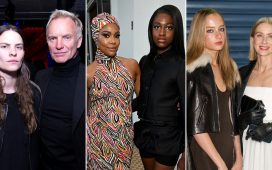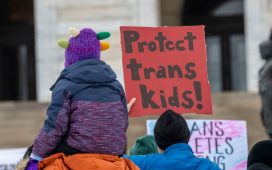I was booed at a lesbian dinner party recently when I dared ask if anyone else thought the The L Word: Generation Q had too much sex.
Now, hear me out: I am not a prude. I like a good sex scene as much as any deprived lesbian. But when a recent semi-nude romp between two recurring characters on the show moved into a full four minutes, I started to wonder, “Why?” Like a lot about the show, it didn’t feel earned. And that’s what’s been most discouraging about the return of such a groundbreaking series, which, while certainly problematic, was the first lesbian soap opera to invest in the richness of our lives. By comparison, Generation Q (whose first season finale aired Sunday) is, well, boring, and the lengthy sex scenes provide less of a narrative than the original show, which, don’t get me wrong, had a ton of sex.
But Generation Q is not a sexy show like The L Word was; it doesn’t carry that same electric energy that moved to Los Angeles with Jenny Schecter and had her exchanging whispers about queer Anne Carson texts with Marina before a clandestine kiss in every lesbian’s favorite place — the bathroom. The three returning stars offer attempts at reconnection to the first version, a messy and often chaotic ensemble soap that drew us in because the characters were so richly drawn, their lives fully inhabited. But the nostalgia provided by Bette, Alice, Shane, and Tina doesn’t provide a raison d’être as much as it does a pang for the old days with Kit (who they have now killed), Dana (still dead), Helena (in London?), and characters who similarly can’t be brought back because they were portrayed by actors of different identities than they should have been and are, in effect, dead to Gen Q as well (Carmen, Max, and Papi.)
The L Word was much slyer in how it introduced new characters into the fold of the West Hollywood set it centered upon, but more importantly, it gave each character dimensions that the new Generation Q are missing. Although the show’s new regulars — Dani, Sophie, Micah, and Finley — are more diverse and played by actors who share the racial and/or gender identity of their characters, they lack a pivotal personhood that would endear us to them or their relationships. We are meant to care that Dani and Sophie become quickly engaged but have tension over Dani’s overbearing father, her obsession with work, and, later, Sophie’s attraction to Finley. But there is nothing for us to hold onto in the way that Bette and Tina gave us a visual, storied history of their love, which became so integral to the show that their relationship became central to it, no matter if they were together or not. Shane’s inability to commit to anyone or anything was explored in truthful but self-defeating ways, as was Alice’s spearheading of the queer community, which provided ample opportunities for run-ins with exes, potential lovers, and public figures in lesbian culture. (She still does that to an extent on “Generation Q” with her talk show, but as a reporter, her white feminism in the writers’ room and low standard of professionalism in interviews irked me. Even then, she’s the only one interfacing with the likes of Megan Rapinoe or Roxane Gay, whereas a Sleater-Kinney concert used to bring the whole group together.)








